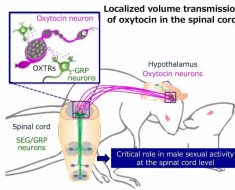What promotes a happy, successful relationship?
More and more marriages are already divorced after a short time and fail. This raises the question: What is the secret of a well-functioning and happy marriage is? Doctors found out now that the key to a happy marriage lies in our genes.
The scientists at the internationally recognized Yale University found in their recent study that the secret to a happy and stable marriage is not necessarily just in our behavior, but also in the genes. The experts published the results of their study in the English journal “PLOS ONE”.

Happy marriages often have a common Genmerkmal
For the study, a total of 178 married couples were investigated. In the case of the Participants, which lived in a secure and happy marriage, and have seen the doctors is a common Genmerkmal. The researchers focused the investigation on the role of a genetic Variation that affects the hormone Oxytocin, which plays in social bonding an important role, known as the GG genotype. As soon as factors were taken into account, such as physical attraction and shared values, explained by the genotype, what had those who felt safe and secure in your marriage, together. This study shows that the feeling that people experience in close relationships, is influenced not only by our shared experiences with our partners in the course of time, explain the authors of the study.
Fears and Worries can affect a marriage
In marriage people are influenced by their own and the genetic predispositions of your partner. People with the so-called GG-genotype are less anxious and worried of commitments, which also comes of your relationship. A worrying bond is a type of relationship insecurity, developed from previous experiences with close family members and partners in the course of life and with a reduced self-esteem, a high level of rejection sensitivity, and an approval-seeking behavior is associated.
How does the GG-genotype on the Ehezufriedenheit?
The study showed that the GG-genotype of a Person and the GG genotype of the Partners together account for approximately four percent of the variance of the Ehezufriedenheit. This percentage may seem small, but has a significant impact on other genetic and environmental factors faced by couples in a relationship. Each participant had to participate in the course of the study, a survey, which dealt with the sense of marital security and satisfaction. In addition, it was provided by the volunteers, a saliva sample for genotyping. (as)





